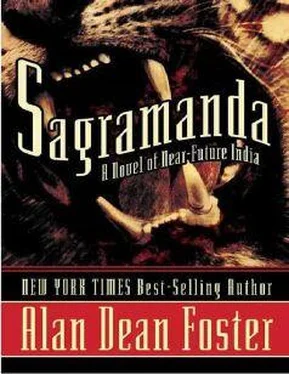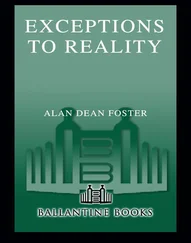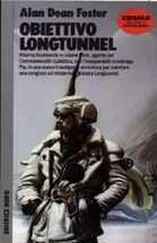Alan Foster - Sagramanda, a Novel of Near-Future India
Здесь есть возможность читать онлайн «Alan Foster - Sagramanda, a Novel of Near-Future India» весь текст электронной книги совершенно бесплатно (целиком полную версию без сокращений). В некоторых случаях можно слушать аудио, скачать через торрент в формате fb2 и присутствует краткое содержание. Жанр: Фантастика и фэнтези, на английском языке. Описание произведения, (предисловие) а так же отзывы посетителей доступны на портале библиотеки ЛибКат.
- Название:Sagramanda, a Novel of Near-Future India
- Автор:
- Жанр:
- Год:неизвестен
- ISBN:нет данных
- Рейтинг книги:5 / 5. Голосов: 1
-
Избранное:Добавить в избранное
- Отзывы:
-
Ваша оценка:
- 100
- 1
- 2
- 3
- 4
- 5
Sagramanda, a Novel of Near-Future India: краткое содержание, описание и аннотация
Предлагаем к чтению аннотацию, описание, краткое содержание или предисловие (зависит от того, что написал сам автор книги «Sagramanda, a Novel of Near-Future India»). Если вы не нашли необходимую информацию о книге — напишите в комментариях, мы постараемся отыскать её.
Sagramanda, a Novel of Near-Future India — читать онлайн бесплатно полную книгу (весь текст) целиком
Ниже представлен текст книги, разбитый по страницам. Система сохранения места последней прочитанной страницы, позволяет с удобством читать онлайн бесплатно книгу «Sagramanda, a Novel of Near-Future India», без необходимости каждый раз заново искать на чём Вы остановились. Поставьте закладку, и сможете в любой момент перейти на страницу, на которой закончили чтение.
Интервал:
Закладка:
Again, Subrata shrugged. "Those of us who have been working on this wanted to be certain, knowing that the consequences would inevitably lead to certain conclusions."
From beneath bushy eyebrows the chief inspector's gaze rose, unblinking. "And you are certain?"
"Sufficient for prosecution, should the perpetrator be found," the other man replied. "It was decided to bring this to you now because of the most recent instances. Two people, a man and a woman, who were fished out of the Hooghly only two days ago. Both bodies came up entangled in a fisherman's net. Before the crocodiles could get to them. Their wounds proved quite consistent with the other twenty-two unsolved cases." He added, almost apologetically, "Australian tourists."
Now his visitor really had the chief inspector's attention. "That's very bad. I don't recall seeing anything about it in yesterday's news, or this morning's."
Subrata allowed himself a thin smile. "Public Relations has been working overtime to keep this one in-house for as long as possible."
Keshu nodded to himself. "Sword-wielding Serial Killer on the Loose in Sagramanda!" was not a headline the municipal authorities would be likely to look forward to seeing splashed all over the front of their morning news report. How long his department could keep such a revelation quiet depended on the reaction of the Australian consulate. Clearly, they were not yet fully in the know. Perhaps his people could keep them in the dark a while longer yet. At least until the unfortunate tourists' friends and relations began to wonder about why they were not hearing from their vacationing friends, and started to make inquiries.
The disclosure prompted another, obvious follow-up question. "And the other twenty-two killings this is related to? Not all tourists, I presume?"
"Only three others. One elderly German gentleman, and an Indonesian couple from Sulawesi. Also two Bangladeshis and a Bhutanese who were not tourists, but illegal workers. The rest all Indian." Subrata gestured with the printout. "There is no pattern to it, sir. Men and women, a number of teenagers, but no children under the age of fifteen. There are victims from every caste, and every walk of life. Rich, poor, middle-class. Dark, light, long and short hair. Nothing to link them except the methodology behind their murders."
"Not just a serial killer, then," Keshu brooded. "One content to choose victims apparently at random. Unless we can establish some additional connection between victims, it suggests our quarry holds no specific grudge against any class or kind of people; only against humanity in general. A nondiscriminatory fanatic."
"That was our conclusion, too, sir." Subrata waited patiently.
Keshu was silent for several moments before he looked up anew. "Thank you for bringing this to my attention, Mr. Subrata. Please keep on it, give it all the attention it needs, and relay that request to your coworkers in Forensics. I want to be informed the moment anything relevant, including possible additional victims of this person or per sons, is discovered. Use my personal contact number."
"Yes sir." The researcher turned to go, hesitated. "Will there be anything else, sir?"
"Just two things." The chief inspector stared at the other man through the space between them. "Hope that this individual or indi viduals makes a mistake. Otherwise they are going to be very hard to catch. And-pray that he or they do not kill any more foreign tourists, or there will be hell to pay for all of us."
"I assure you that my friends and I have already ascertained that possibility, sir." Subrata waited for the door to reascend, then exited through the open portal.
Keshu returned to the study of the morning's readouts, the subor dinate's printout looming ominously on his desk. The Mayapur riot was winding down as a pair of rapid-response tactical squads squeezed it from two sides. Another disturbance threatened to flare up farther to the east. Near the zoo, of all places. He allowed himself a slight smile. Perhaps the city monkeys were trying to liberate their caged cousins. Or one of a number of international and/or local animal rights groups might be involved.
Six rape reports had come in since his arrival. Two arson attempts, one successful, the other quenched in the bud by automatic snuffers built into the infrastructure of the attacked building. One attempted bank holdup, unsuccessful, with both would-be robbers stunned by automated security and their getaway vehicle successfully immobi lized. Violent confrontation at a private college campus between sit-in demonstrators and campus security guards. Assorted muggings, purse-snatchings, and pickpocketings. Child-beatings, wife-beatings, hus band-beatings, beatings of household pets. Vandalism and car break-ins. Arrests for graffiti, extortion, theft of utilities, public defecation.
A normal morning.
Except for the efficient Mr. Subrata's report.
With a sigh, the chief inspector rested his elbows on his desk and rubbed at his eyes with the heels of both hands. On top of everything, his wife had been nagging him mercilessly for the past week about the vacation they were supposed to have taken last month that he continued to put off. She would wave the reservation forms for the Maldives resort in his face at every opportunity.
Smiling encouragingly, touching him affectionately while doing so, but it still counted as nagging.
What a job, he told himself. What a life. He wouldn't have traded it for anything.
Better to have a wife ragging on you than a serial killer, he told him self. Using a curt voice command to halt the heads-up readout from the box, he slipped the fingers of his right hand into the controller glove and dove physically as well as mentally into the morning's work.
*4*
Chalcedony Schneemann hated Sagramanda. For that matter, he hated India, even though he was half Indian. His mother had been born in Belgaum, in the southwest, and had grown up working in the tourist hotspot of Goa. That was where she had met his father, a German-American executive on holiday. They had fallen in love, she had become instantly pregnant, and he had taken her back with him to New York. But his mother had never for gotten her heritage. Growing up, he had been compelled to learn Hindi and Marathi as well as English and German.
For a corporate fixer whose job category supposedly did not exist, and who was paid in cash and under the table, Chal Schneemann was very well spoken.
Everyone who knew him called him Chal. He preferred it, and it worked out well, since nobody could pronounce his full first name properly anyway (he had been named after his mother's favorite semi precious gemstone). He had been in Sagramanda for six months now and was no closer to finding his quarry than he was to developing a fondness for the gigantic, seething, steaming metropolis. He missed New York badly; its comparative cleanliness, its museums and concerts, its cultured women who could converse intelligently even when they were being screwed into the floor. Even the Indian food was better there, he grumbled to himself, and you didn't have to conduct a minute inspection of the restaurant's toilet before voiding your bowels.
An impartial observer might have commented gently that Chal was not permitting himself to be open to the experience, was not allowing the charms of the great city to infuse and inform him with its multifarious delights. By way of response, Chal most likely would have beat the crap out of said impartial observer, if not for the fact that it was critical to his work that he pass everywhere unnoticed. Officially, he was in Sagramanda to advise one executive at one branch of the well-known multinational company that paid him handsomely (and under the table) to travel around the world (though most often to the subcontinent) to solve otherwise intractable corporate problems.
Читать дальшеИнтервал:
Закладка:
Похожие книги на «Sagramanda, a Novel of Near-Future India»
Представляем Вашему вниманию похожие книги на «Sagramanda, a Novel of Near-Future India» списком для выбора. Мы отобрали схожую по названию и смыслу литературу в надежде предоставить читателям больше вариантов отыскать новые, интересные, ещё непрочитанные произведения.
Обсуждение, отзывы о книге «Sagramanda, a Novel of Near-Future India» и просто собственные мнения читателей. Оставьте ваши комментарии, напишите, что Вы думаете о произведении, его смысле или главных героях. Укажите что конкретно понравилось, а что нет, и почему Вы так считаете.










